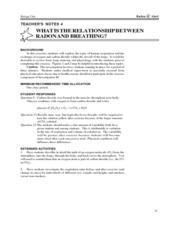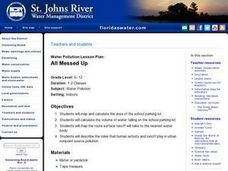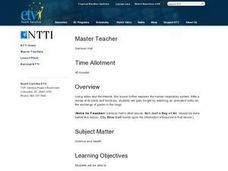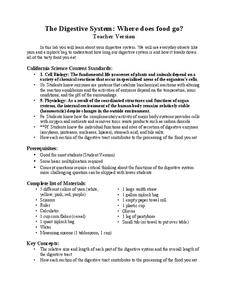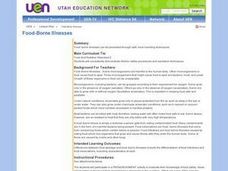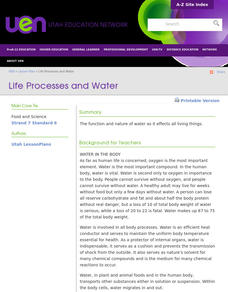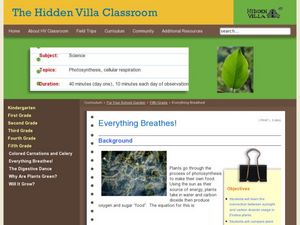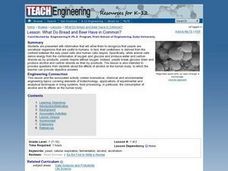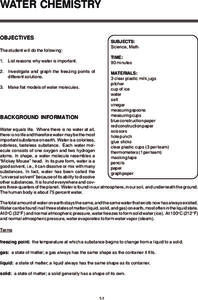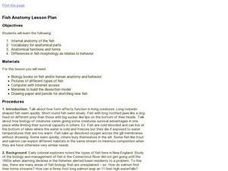Curated OER
What Is In The Water?
Students investigate the biotic and abiotic factors that are found in an aquatic ecosystem. The emphasis is upon the investigation of present an projections of future water quality. Then students visit a local body of water to gather...
Curated OER
Go Jump In The Lake!
Students experiment with local lake water to determine the health of the lake waters. They explore the human impact on the lake water, hypothesize and share inferences in a scientific report.
Curated OER
Anatomy
Second graders identify the major organs of the body and their primary function, identify major systems of the body, and describe behaviors that protect the body structure and organs.
Curated OER
Fire Triangle
Learners discuss what humans need to stay alive. They observe a candle that is lit and talk about candle safety and controls. They think about what a candle needs to keep burning and relate it to what people need to stay alive. They...
Curated OER
The Journey of a Red Blood Cell
Fifth graders examine how a red blood cell travels throughout the body. Using a model, they follow the flow of blood throughout the entire body. They identify the functions of the lungs and discuss the difference of the blood entering...
Curated OER
Water
Students examine water, its function and how much you should consume. In this water lesson students study water and why it is important, how much you should drink and what its functions are in your body.
Curated OER
What Is The Relationship Between Radon and Breathing?
Students examine the effects of radon on their breathing. They review the anatomy of the respiratory system before completeing this lesson plan. They also complete equations to show how carbon dioxide forms in their body.
Curated OER
Water Quality
Students play the role of scientists testing for water quality in the area. In this ecology lesson, students determine the water sample's pH, temperature, dissolved oxygen and turbidity. They write a journal reflection after the activity.
Curated OER
Parasites: Our Tiny Companions
Young scholars consider parasites that seek human hosts. They prepare nutrient agar plates and cultivate samples of bacteria taken from their own bodies. They experiment with disinfectants and soaps to determine which method kills the...
Curated OER
All Messed Up
Pupils begin the experiment by mapping and calculating their school parking lot. They calculate the volume of water falling on the lot and map the route the water runoff takes. They discuss the roles that humans play in affecting water...
Curated OER
CO2 Blow Out!
Fifth graders determine that carbon dioxide is a gas given off during respiration and that oxygent is the gas that is absorbed during respiration. They determine the air capacity of the lungs.
Kenan
Respiratory System
Explore the respiratory system with a model. First, pupils build a set of lungs to experiment how they inflate and deflate. Then, they delve deeper into the topic with a web quest to discover new information about the nose, trachea, and...
LABScI
The Digestive System: Where Does Food Go?
Would you believe that your digestive system stretches to five times your height?! Help your pupils to understand this relationship as they work through the laboratory exercise. The first instructional activity of a 12-part series is a...
LABScI
Circulation and Respiration: Vital Signs
What do your vital signs tell your doctor? An engaging hands-on lesson plan has your learners monitor their own lung capacity, blood pressure, and heart rate. They then connect the vital measures to the workings of the circulatory and...
Curated OER
Food-Borne Illnesses
Use this lesson to have your charges consider the differences between food spoilage and food-borne illnesses including the differentiation of food infections and food intoxication, including characteristics of each. Some excellent...
Curated OER
Life Processes and Water
Explain the properties of water. Identify the properties of water that make it a polar molecule Describe hydrogen bonds and how they differ from covalent bonds Discuss the differences between hard water and soft water Compare the heat of...
Curated OER
Everything Breathes!
Fifth graders test plants in the dark and in the light to see which grows better and produces more carbon dioxide. In this plants lesson plan, 5th graders also create ways for plants to go through photosynthesis that they can observe.
Outdoor Learning Center
Outdoor Survival
Which of the following can you survive without for the longest time: water, food, or a positive mental attitude? The answer may surprise you. Guide learners of all ages through games, activities, and discussions about surviving in the...
Virginia Department of Education
Changes in Ecosystems
How does water pollution affect the environment? Provide your class with the resources to answer this question as they learn about eutrophication and ecosystem changes. Over two weeks, they simulate the effects of pollution on the...
Curated OER
Health: Food Borne Illnesses
Students discover how to inhibit food borne illnesses by practicing safe food-handling techniques. Among topics they examine are the advantages and disadvantages of using wooden or plastic cutting boards. After studying for the test,...
Curated OER
Science: Comparing Beer and Bread
Students compare and contrast cellular respiration in yeast and plant and animal cells. After discovering the role of yeast in making beer and bread, they describe the short and long term effects of alcohol on the nervous and digestive...
Curated OER
Air and Water in the Environment
Second graders participate in a three part lesson plan in which they identify and describe forms of moisture in the environment. Part one of the lesson plan involves the three stages of the water cycle, part two focuses on creating...
Curated OER
WATER CHEMISTRY
Students list reasons why water is important and investigate and graph the freezing points of different solutions.
Curated OER
Fish Anatomy
Students identify and interpret the internal anatomy of the fish. They also identify and define vocabulary for anatomical parts and anatomical functions and forms. Finally, students identify and interpret the differences in fish...








